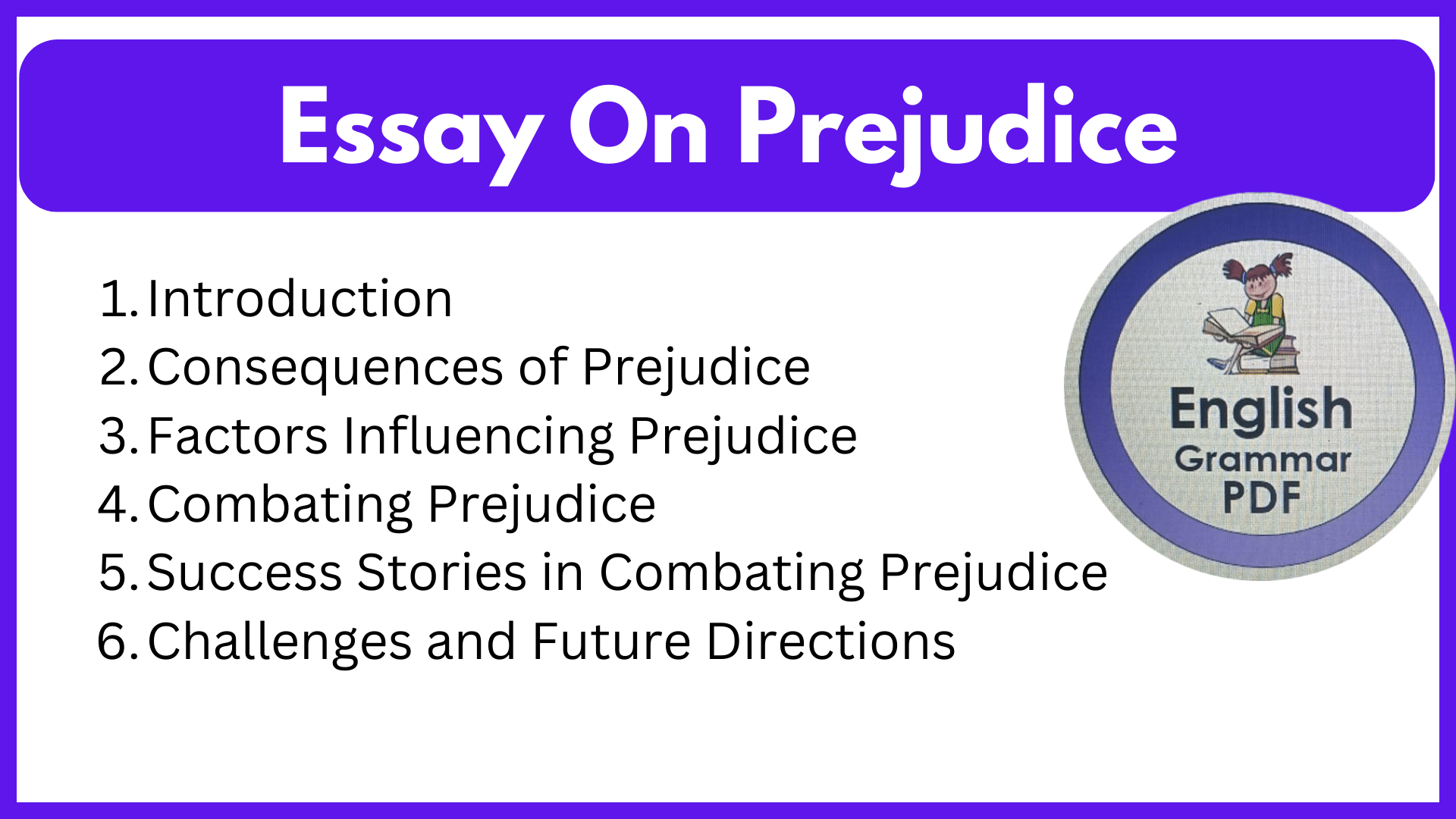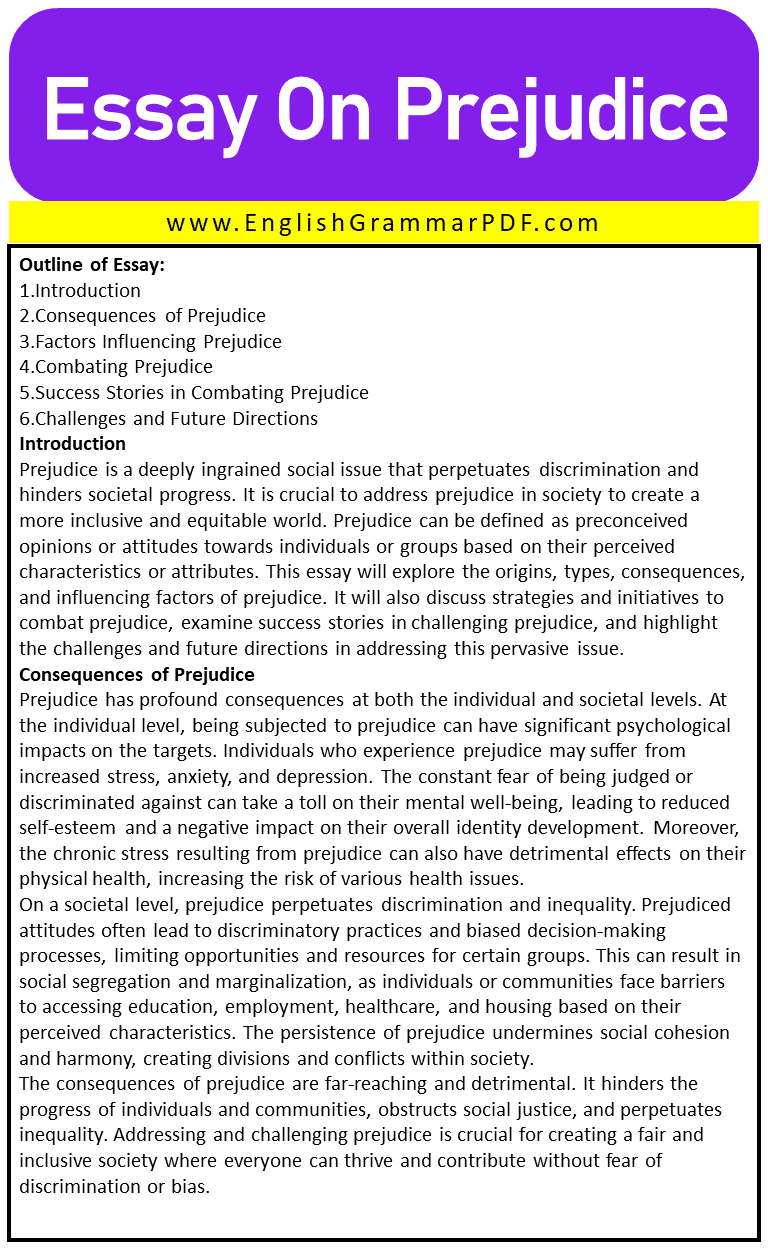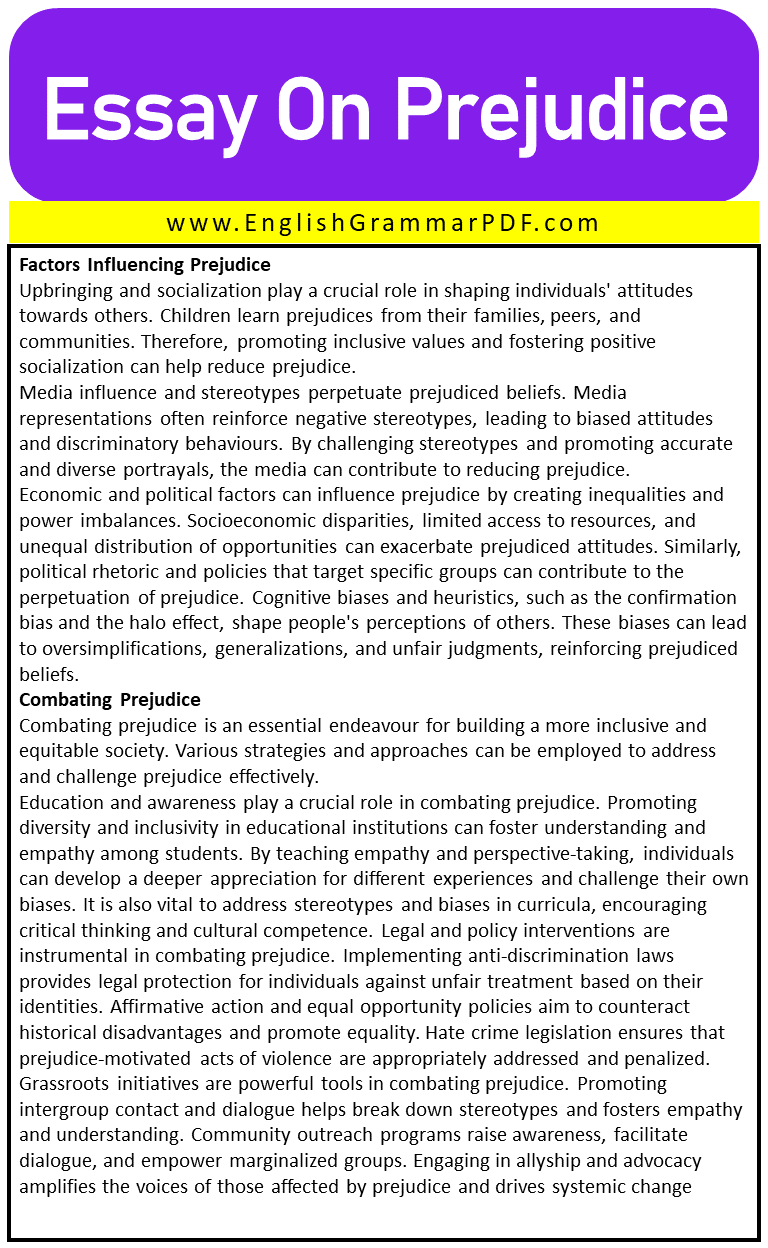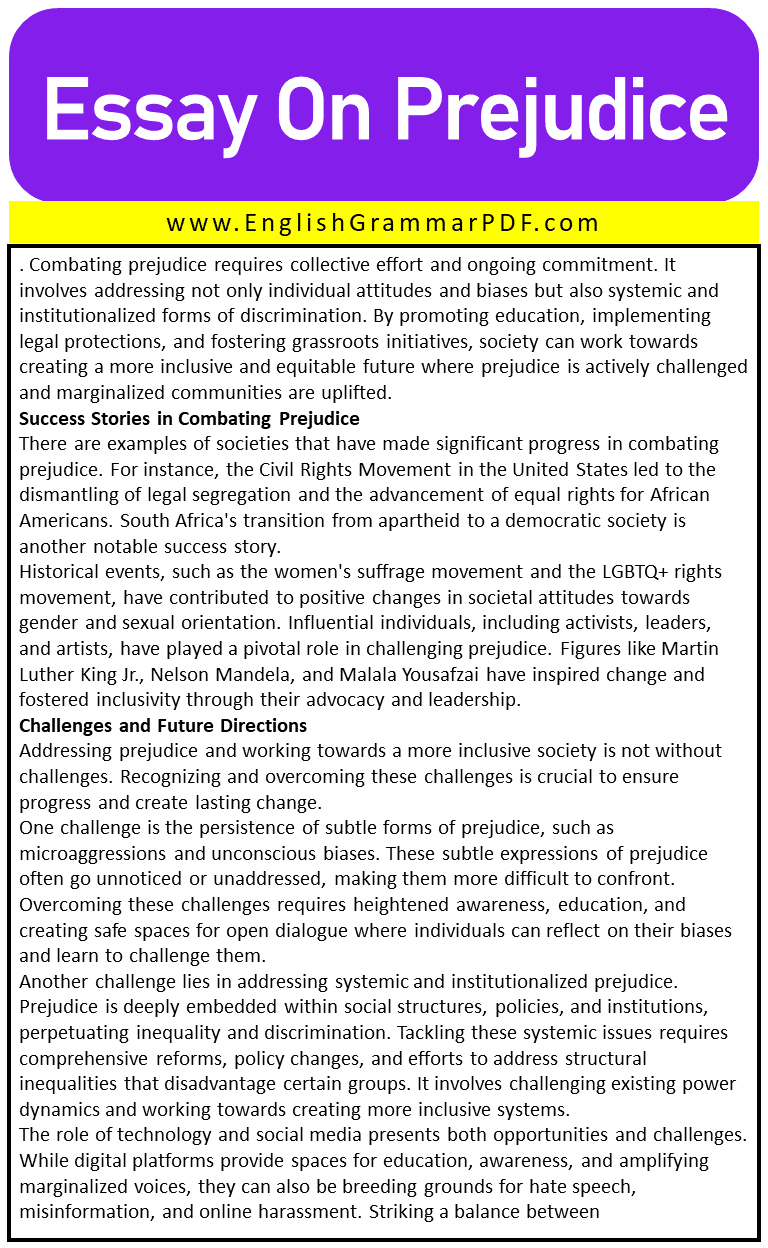Essay On Prejudice
Outline of Essay:
- Introduction
- Consequences of Prejudice
- Factors Influencing Prejudice
- Combating Prejudice
- Success Stories in Combating Prejudice
- Challenges and Future Directions
Introduction
Prejudice is a deeply ingrained social issue that perpetuates discrimination and hinders societal progress. It is crucial to address prejudice in society to create a more inclusive and equitable world. Prejudice can be defined as preconceived opinions or attitudes towards individuals or groups based on their perceived characteristics or attributes. This essay will explore the origins, types, consequences, and influencing factors of prejudice. It will also discuss strategies and initiatives to combat prejudice, examine success stories in challenging prejudice, and highlight the challenges and future directions in addressing this pervasive issue.
Consequences of Prejudice
Prejudice has profound consequences at both the individual and societal levels. At the individual level, being subjected to prejudice can have significant psychological impacts on the targets. Individuals who experience prejudice may suffer from increased stress, anxiety, and depression. The constant fear of being judged or discriminated against can take a toll on their mental well-being, leading to reduced self-esteem and a negative impact on their overall identity development. Moreover, the chronic stress resulting from prejudice can also have detrimental effects on their physical health, increasing the risk of various health issues.
On a societal level, prejudice perpetuates discrimination and inequality. Prejudiced attitudes often lead to discriminatory practices and biased decision-making processes, limiting opportunities and resources for certain groups. This can result in social segregation and marginalization, as individuals or communities face barriers to accessing education, employment, healthcare, and housing based on their perceived characteristics. The persistence of prejudice undermines social cohesion and harmony, creating divisions and conflicts within society.
The consequences of prejudice are far-reaching and detrimental. It hinders the progress of individuals and communities, obstructs social justice, and perpetuates inequality. Addressing and challenging prejudice is crucial for creating a fair and inclusive society where everyone can thrive and contribute without fear of discrimination or bias.
Factors Influencing Prejudice
Upbringing and socialization play a crucial role in shaping individuals’ attitudes towards others. Children learn prejudices from their families, peers, and communities. Therefore, promoting inclusive values and fostering positive socialization can help reduce prejudice.
Media influence and stereotypes perpetuate prejudiced beliefs. Media representations often reinforce negative stereotypes, leading to biased attitudes and discriminatory behaviours. By challenging stereotypes and promoting accurate and diverse portrayals, the media can contribute to reducing prejudice.
Economic and political factors can influence prejudice by creating inequalities and power imbalances. Socioeconomic disparities, limited access to resources, and unequal distribution of opportunities can exacerbate prejudiced attitudes. Similarly, political rhetoric and policies that target specific groups can contribute to the perpetuation of prejudice. Cognitive biases and heuristics, such as the confirmation bias and the halo effect, shape people’s perceptions of others. These biases can lead to oversimplifications, generalizations, and unfair judgments, reinforcing prejudiced beliefs.
Combating Prejudice
Combating prejudice is an essential endeavour for building a more inclusive and equitable society. Various strategies and approaches can be employed to address and challenge prejudice effectively.
Education and awareness play a crucial role in combating prejudice. Promoting diversity and inclusivity in educational institutions can foster understanding and empathy among students. By teaching empathy and perspective-taking, individuals can develop a deeper appreciation for different experiences and challenge their own biases. It is also vital to address stereotypes and biases in curricula, encouraging critical thinking and cultural competence. Legal and policy interventions are instrumental in combating prejudice. Implementing anti-discrimination laws provides legal protection for individuals against unfair treatment based on their identities. Affirmative action and equal opportunity policies aim to counteract historical disadvantages and promote equality. Hate crime legislation ensures that prejudice-motivated acts of violence are appropriately addressed and penalized.
Grassroots initiatives are powerful tools in combating prejudice. Promoting intergroup contact and dialogue helps break down stereotypes and fosters empathy and understanding. Community outreach programs raise awareness, facilitate dialogue, and empower marginalized groups. Engaging in allyship and advocacy amplifies the voices of those affected by prejudice and drives systemic change. Combating prejudice requires collective effort and ongoing commitment. It involves addressing not only individual attitudes and biases but also systemic and institutionalized forms of discrimination. By promoting education, implementing legal protections, and fostering grassroots initiatives, society can work towards creating a more inclusive and equitable future where prejudice is actively challenged and marginalized communities are uplifted.
Success Stories in Combating Prejudice
There are examples of societies that have made significant progress in combating prejudice. For instance, the Civil Rights Movement in the United States led to the dismantling of legal segregation and the advancement of equal rights for African Americans. South Africa’s transition from apartheid to a democratic society is another notable success story.
Historical events, such as the women’s suffrage movement and the LGBTQ+ rights movement, have contributed to positive changes in societal attitudes towards gender and sexual orientation. Influential individuals, including activists, leaders, and artists, have played a pivotal role in challenging prejudice. Figures like Martin Luther King Jr., Nelson Mandela, and Malala Yousafzai have inspired change and fostered inclusivity through their advocacy and leadership.
Challenges and Future Directions
Addressing prejudice and working towards a more inclusive society is not without challenges. Recognizing and overcoming these challenges is crucial to ensure progress and create lasting change.
One challenge is the persistence of subtle forms of prejudice, such as microaggressions and unconscious biases. These subtle expressions of prejudice often go unnoticed or unaddressed, making them more difficult to confront. Overcoming these challenges requires heightened awareness, education, and creating safe spaces for open dialogue where individuals can reflect on their biases and learn to challenge them.
Another challenge lies in addressing systemic and institutionalized prejudice. Prejudice is deeply embedded within social structures, policies, and institutions, perpetuating inequality and discrimination. Tackling these systemic issues requires comprehensive reforms, policy changes, and efforts to address structural inequalities that disadvantage certain groups. It involves challenging existing power dynamics and working towards creating more inclusive systems.
The role of technology and social media presents both opportunities and challenges. While digital platforms provide spaces for education, awareness, and amplifying marginalized voices, they can also be breeding grounds for hate speech, misinformation, and online harassment. Striking a balance between utilizing technology for positive change while combating its negative effects remains an ongoing challenge. To overcome these challenges, future directions in combating prejudice involve continued efforts in education and awareness, policy reforms, and grassroots initiatives. It is essential to promote diversity, empathy, and inclusivity from an early age, integrate anti-prejudice measures into policies, and foster intergroup dialogue and understanding.
FAQ’s
What are the 5 stages of prejudice?
This research used Gordon Allport’s theory of the stages of prejudice which are divided into 5 stages, namely; (1) Antilocutin, (2) Avoidance, (3) Discrimination, (4) Physical attack, and (5) Extermination.
What is prejudice in psychology?
Prejudice is defined in this report as ‘bias which devalues people because of their perceived membership of a social group’.
Explore More Essays:
Download the PDF of the Essay:







